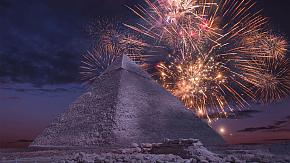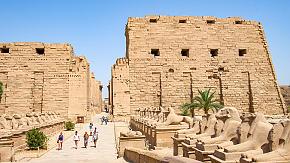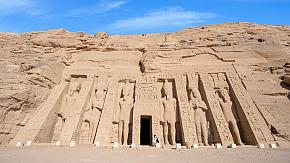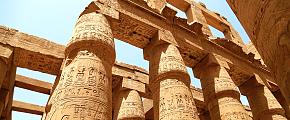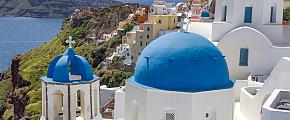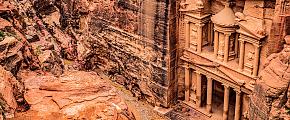Comprehensive Egypt Travel Guide 2025
Country Overview
The Land of the Pharaohs is the first tourist destination in Africa. A country of contrasts, shrouded in mystery, that combines the magnificence of the Nile River and incredibly beautiful desert landscapes.
Famous throughout the world for the pyramids and countless archeological sites, Egypt links Asia and Africa and is the bridge between Arab and African cultures. Visit the cradle of civilization and you will wander around bustling souks in Cairo, enjoy an unforgettable cruise along the Nile River, and admire the only one of the Seven Wonders of the Ancient World that still remains -the Great Pyramid of Giza- and dive in the Red Sea. As the Greek historian, Herodotus once said: "Whoever has not seen Egypt has not seen the world."
Country at a Glance
- Capital: Cairo
- Population: 100 million
- Language: Egyptian Arabic
- Currency: Egyptian pound (EGP)
- Time Zone: GMT +2
- Electricity: 220 V / 50 Hz. Sockets: Type C, Type F
- Dialing code: +20
Best Time to Visit Egypt
A year-round destination, Egypt is hot and sunny throughout the year, with very little rainfall south of Cairo. Temperatures are generally high, particularly from late May to early September, with very high levels of humidity. If the weather is your main concern, you should consider visiting the country between October and April, when temperatures are cooler but still pleasantly warm.
The traditional tourist season runs from November to late February. The main touristic spots get very crowded during the peak months of December and January, and accommodation is more expensive. Make sure you plan your sightseeing for the early mornings or evenings in order to avoid the midday heat.
Some attractions and shops may close earlier than usual during Ramadan, the 30-day period when Muslims fast from sunrise to sunset, which can be problematic for eating and transport. The summer months are the best time to visit the Red Sea Beach resorts since temperatures on the coast are much cooler than in the interior. Diving is good all year round.
Top Cities to Visit
Knowing the main cities will help you plan your trip around Egypt. The country, one of the oldest tourist destinations in the world, has plenty of natural and cultural features, making it the perfect choice for sightseeing at historic sites such as the Giza Pyramids or the Luxor Temple; for a Nile River cruise, or for snorkeling along coral walls.
Cairo
The largest metropolitan area not only in Egypt but in Africa and in the Middle East, Cairo is at the same time an ancient city and a modern megalopolis. There is no place like this "City of a Thousand Minarets" for those willing to know Egyptian culture and history. Cairo
Cairo
Alexandria
Founded in 331 BC by Alexander the Great on the northern coast of the country, Alexandria was once the cultural capital of the world, with its Great Library and the famous Lighthouse as its landmarks.
Giza
Only 5 km southwest of Cairo, Giza is famous worldwide for the pyramid complex, which includes the pyramids of Khufu, Khafre, and Menkaure, and the Great Sphinx, which have become the emblems of Ancient Egypt.
Luxor
Built amid the ruins of ancient Thebes, Luxor -where kings and queens of Old Egypt were crowned- is often described as the world's greatest open-air museum due to its overwhelming wealth of temples, monuments, and tombs.
Aswan
Lying on the shores of the Nile River, at its first cataract, Aswan is Egypt's southernmost city and the perfect base from which to explore the High Dam, the Philae Temple, and the Unfinished Obelisk, and to sail along the river onboard a traditional felucca boat.
Hurghada
With wonderful coral reefs and some of the world's top diving spots, Hurghada has grown from a small fishing village to the perfect sun-and-beach destination: sunshine and warm waters throughout the year for those who want to relax by the Red Sea coast.
Things to Do
For centuries, millions of tourists from all over the world have traveled to Egypt, attracted by the magnificence and the mystery of the pyramids and the temples. Giza, Luxor, Aswan... Egypt is full of extraordinary archaeological sites. But there are as well many natural wonders, such as the Nile River and the Red Sea coast.
Visit the Pyramids
Built as tombs for the pharaohs, they are the country's most iconic landmarks. Besides the three main pyramids at Giza, there are many others worth a visit, like the Step Pyramid of Djoser in Saqqara. A camel ride around the pyramids can be an unforgettable experience.
 Pyramid in Egypt
Pyramid in Egypt
Explore the Valley of the Kings
On the west bank of the Nile River near Luxor, the Valley of the Kings contains more than 60 rock-cut tombs that house the deceased pharaohs of the New Kingdom. Among them, is the famous tomb of Tutankhamun, discovered by British Egyptologist Howard Carter in 1922.
Attend the Sound and Light Show in Abu Simbel
In these impressive temples, dedicated to Ramesses II and Queen Nefertari and moved from their original setting in the 1960s to save them from flood damage, you can see an evening show where Ramesses' story is told through images, light, and sound.
Cruise the Nile River
There is not a better way to see the temples on the banks of the river on the route between Luxor and Aswan. There is a wide range of options, ranging from luxury cruisers to traditional feluccas, from which the Temple of Kom Ombo and Edfu's Temple of Horus can be seen.
 Nile Crusise
Nile Crusise
Tour the Egyptian Museum
The museum with the world's most extensive collection of Pharaonic ancient artifacts is a must-visit place for those traveling to Egypt. Among many other relics, here you will see the Golden Mask of Tutankhamun, probably the best-known object from Ancient Egypt.
Dive in the Red Sea
There are many places along the Red Sea coast where you can practice scuba diving. Resort towns of Hurghada and Sharm el-Sheikh are the most popular, with many diving schools providing courses and the diving gear needed, no matter if you are an experienced diver or a first-timer.
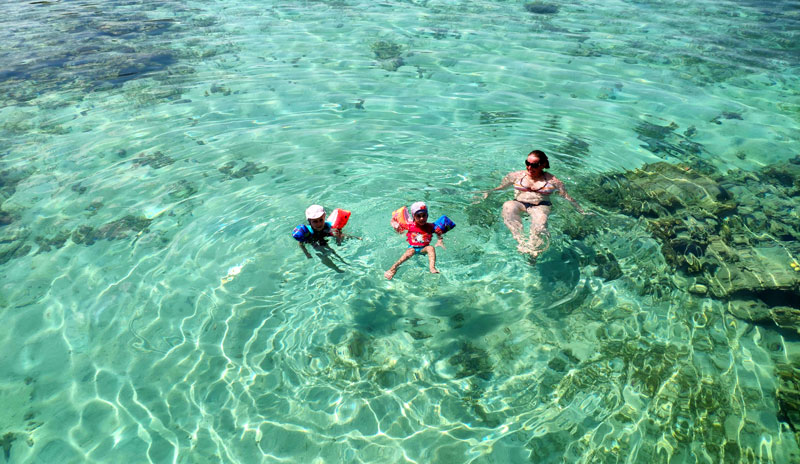 Red Sea
Red Sea
Shop at Khan el-Khalili bazaar
The most famous souk in the Middle East was established as a shopping district in the 14th century. Whether you are looking for a toy camel, a pyramid, or a belly-dancer customer, you will find it at Khan el-Khalili bazaar.
Things to Buy
Egypt's souks, where you can buy everything from cheap souvenirs to household goods, are famous all over the world and one of the most remarkable attractions of the country. These local markets can be found in almost every city, and sellers might even treat you to a cup of tea while showing you the products. Haggling is expected and necessary, so try your best to get cheap prices.
Papyrus Scrolls
Papyrus is the thick paper that Ancient Egyptians used for writing. Hand-painted papyrus scrolls are beautiful and easy to transport and can be framed once you are back in your country.
Spices
Fragrant and brightly colored, they are sold by weight in almost every market. Turmeric, coriander, cumin, cardamom... Pack them properly, take them back with you and surprise your friends by cooking the delicious dishes you enjoyed during your trip to Egypt.
Souvenirs
You will see so many different kinds of mementos that you might not have enough space in your suitcase. The most popular are the cartouches -pendants with personalized names in hieroglyphics- and glass bottles filled with sand for decoration.
 Souvenirs in Egypt
Souvenirs in Egypt
Cotton
Considered one of the best quality fabrics in the world due to its softness and strength, Egyptian cotton is much sought-after by travelers willing to take buy jumpers, scarfs, towels, bathrobes, or bed sheets.
What to Eat
The country's location, between Africa, Asia, and Europe, gives many brings many different influences to Egyptian cuisine: Egypt's food is as wonderful as its history. Although it may look similar to those from other Middle East countries, relying heavily on stews, vegetables, and legumes, it has its own unique flavors, with some delicious meat dishes as well. Egyptians usually dine later than westerners, and lunch is their main meal of the day. On the Red Sea coast, do not forget to try at least one of their excellent seafood restaurants.
Some of the Most Popular Dishes in Egypt Are:
Ful medames:
made of fava beans cooked with oil and salt. It is considered the national dish.
Ta'ameya (Falafel):
deep-fried balls made with broad beans.
Kushari:
rice, macaroni, and lentils, topped with the tangy sauce.
Hamam Mahshi:
a pigeon stuffed with rice and nuts, and grilled over a wood fire.
Hummus:
crushed chickpeas, garlic, olive oil, lemon, and tahini, served with pita bread.
Shawarma:
slices of marinated meat wrapped in a bun. Very popular as street food.
Pita bread:
commonly used as a utensil to scoop food and sauces.
The great majority of Egyptians are Muslim and do not eat pork because of religious reasons. During Ramadan, they fast from dawn to sunset. Unless in an international hotel, try not to eat in public during Ramadan, and always eat with your right hand.
In main cities like Cairo, Alexandria, or Luxor, and in the Red Sea resort towns, you will find many international restaurants. But, in smaller towns, only local cuisine will be available, ranging from luxury restaurants to budget canteens and street food. Alcoholic drinks can be hard to find outside the main touristic spots. Keep in mind that tap water is not safe to drink.
Arriving and Getting Around
Cairo International Airport is the biggest and busiest in the country and serves as the primary hub for several national and international airlines.
For domestic travel, EgyptAir and Nile Air fly between Cairo and the main cities; fares are usually cheap. When not flying, the train is the most efficient and comfortable option for Alexandria, Aswan, and Luxor. There are also frequent air-conditioned buses between all major cities, but delays are common. Identity checks are common, so do not forget to take your passport with you.
When visiting Egypt, a cruise down the Nile River between Aswan and Luxor is a must.
As for city transport, Cairo is currently the only city in the country with a metro system, although construction of the Alexandria Metro has already begun. Taxis are cheap and available even in small cities; for long rides, you should negotiate the fare in advance. City buses are rarely used by visitors, as they are usually overcrowded and numbers are displayed in Arabic numerals.
Dressing
As an Islamic country, Egypt is fairly conservative, therefore it is recommended to dress modestly, especially for women. Unless in resorts, women should keep shoulders and knees covered at all times, especially when visiting churches or mosques, or in rural areas. Tourists are not required to wear any hair covering.
Men can wear shorts and T-shirts in the whole country, although sleeveless t-shirts and shorts should only be worn at resorts. It is advisable for women to wear trousers or jeans while visiting the pyramids, as visitors have to ascend and descend ladders and narrow passageways. To combat the heat, cotton or linen clothing is highly recommended. The floors of most sites will be either sandy or rough-cut, so make sure you wear comfortable shoes.
Do not forget to take a hat, sunglasses, sunscreen, and mosquito repellent. Eye drops can be useful against dust.
Hotels
Accommodation offered in Egypt ranges from luxury resorts of international chains -available in main cities and the Red Sea coast- to budget B&B and family-run hostels. High-level accommodation offers all the usual facilities, while two and one-star hotels will supply fans instead of air conditioning. There are several places for camping, but many security restrictions are in place in order to protect Egypt's tourist industry. Booking in advance can get you a discount, especially in the low season, and it is essential if you are planning to travel during Christmas or Easter. On the Mediterranean coast, prices rise significantly during the summer months.
Hotels are graded 1-5 stars, but standards differ greatly from those in European or American hotels. Although officially illegal, some of them accept US dollars and euros. Keep in mind that taxes are usually not included in quoted rates.
All-inclusive rates are available in nearly all resorts on the Red Sea coast. Diving and snorkeling excursions are arranged on a daily basis.
Quick Question
What Our Clients Say
Explore the latest verified reviews of Odynovo's travel services on Tripadvisor, Google, Trustpilot, Product Review and more trusted platforms.
SUBSCRIBE TO WIN A FREE TOUR
Subscribe to our newsletter for a chance to win a free 7-day tour to India! And more insider travel news, exclusive offers, and inspiration will be sent straight to your inbox. Check our previous newsletters and get some sparks.

